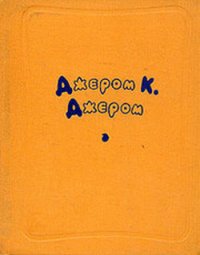Three Men on the Bummel - Jerome Jerome Klapka (бесплатные книги полный формат .TXT) 📗
Less often, it is a mere male thing that rides the machine. He is not so accomplished an acrobat as is the lady; but simple tricks, such as standing on the saddle and waving flags, drinking beer or beef-tea while riding, he can and does perform. Something, one supposes, he must do to occupy his mind: sitting still hour after hour on this machine, having no work to do, nothing to think about, must pall upon any man of active temperament. Thus it is that we see him rising on his pedals as he nears the top of some high hill to apostrophise the sun, or address poetry to the surrounding scenery.
Occasionally the poster pictures a pair of cyclists; and then one grasps the fact how much superior for purposes of flirtation is the modern bicycle to the old-fashioned parlour or the played-out garden gate. He and she mount their bicycles, being careful, of course, that such are of the right make. After that they have nothing to think about but the old sweet tale. Down shady lanes, through busy towns on market days, merrily roll the wheels of the "Bermondsey Company's Bottom Bracket Britain's Best," or of the "Camberwell Company's Jointless Eureka." They need no pedalling; they require no guiding. Give them their heads, and tell them what time you want to get home, and that is all they ask. While Edwin leans from his saddle to whisper the dear old nothings in Angelina's ear, while Angelina's face, to hide its blushes, is turned towards the horizon at the back, the magic bicycles pursue their even course.
And the sun is always shining and the roads are always dry. No stern parent rides behind, no interfering aunt beside, no demon small boy brother is peeping round the corner, there never comes a skid. Ah me! Why were there no "Britain's Best" nor "Camberwell Eurekas" to be hired when WE were young?
Or maybe the "Britain's Best" or the "Camberwell Eureka" stands leaning against a gate; maybe it is tired. It has worked hard all the afternoon, carrying these young people. Mercifully minded, they have dismounted, to give the machine a rest. They sit upon the grass beneath the shade of graceful boughs; it is long and dry grass. A stream flows by their feet. All is rest and peace.
That is ever the idea the cycle poster artist sets himself to convey-rest and peace.
But I am wrong in saying that no cyclist, according to the poster, ever works. Now I come to reflect, I have seen posters representing gentlemen on cycles working very hard-over-working themselves, one might almost say. They are thin and haggard with the toil, the perspiration stands upon their brow in beads; you feel that if there is another hill beyond the poster they must either get off or die. But this is the result of their own folly. This happens because they will persist in riding a machine of an inferior make. Were they riding a "Putney Popular" or "Battersea Bounder," such as the sensible young man in the centre of the poster rides, then all this unnecessary labour would be saved to them. Then all required of them would be, as in gratitude bound, to look happy; perhaps, occasionally to back-pedal a little when the machine in its youthful buoyancy loses its head for a moment and dashes on too swiftly.
You tired young men, sitting dejectedly on milestones, too spent to heed the steady rain that soaks you through; you weary maidens, with the straight, damp hair, anxious about the time, longing to swear, not knowing how; you stout bald men, vanishing visibly as you pant and grunt along the endless road; you purple, dejected matrons, plying with pain the slow unwilling wheel; why did you not see to it that you bought a "Britain's Best" or a "Camberwell Eureka"? Why are these bicycles of inferior make so prevalent throughout the land
Or is it with bicycling as with all other things: does Life at no point realise the Poster?
The one thing in Germany that never fails to charm and fascinate me is the German dog. In England one grows tired of the old breeds, one knows them all so well: the mastiff, the plum-pudding dog, the terrier (black, white or rough-haired, as the case may be, but always quarrelsome), the collie, the bulldog; never anything new. Now in Germany you get variety. You come across dogs the like of which you have never seen before: that until you hear them bark you do not know are dogs. It is all so fresh, so interesting. George stopped a dog in Sigmaringen and drew our attention to it. It suggested a cross between a codfish and a poodle. I would not like to be positive it was NOT a cross between a codfish and a poodle. Harris tried to photograph it, but it ran up a fence and disappeared through some bushes.
I do not know what the German breeder's idea is; at present he retains his secret. George suggests he is aiming at a griffin. There is much to bear out this theory, and indeed in one or two cases I have come across success on these lines would seem to have been almost achieved. Yet I cannot bring myself to believe that such are anything more than mere accidents. The German is practical, and I fail to see the object of a griffin. If mere quaintness of design be desired, is there not already the Dachshund! What more is needed? Besides, about a house, a griffin would be so inconvenient: people would be continually treading on its tail. My own idea is that what the Germans are trying for is a mermaid, which they will then train to catch fish.
For your German does not encourage laziness in any living thing. He likes to see his dogs work, and the German dog loves work; of that there can be no doubt. The life of the English dog must be a misery to him. Imagine a strong, active, and intelligent being, of exceptionally energetic temperament, condemned to spend twenty-four hours a day in absolute idleness! How would you like it yourself? No wonder he feels misunderstood, yearns for the unattainable, and gets himself into trouble generally.
Now the German dog, on the other hand, has plenty to occupy his mind. He is busy and important. Watch him as he walks along harnessed to his milk cart. No churchwarden at collection time could feel or look more pleased with himself. He does not do any real work; the human being does the pushing, he does the barking; that is his idea of division of labour. What he says to himself is:
"The old man can't bark, but he can shove. Very well."
The interest and the pride he takes in the business is quite beautiful to see. Another dog passing by makes, maybe, some jeering remark, casting discredit upon the creaminess of the milk. He stops suddenly, quite regardless of the traffic.
"I beg your pardon, what was that you said about our milk?"
"I said nothing about your milk," retorts the other dog, in a tone of gentle innocence. "I merely said it was a fine day, and asked the price of chalk."
"Oh, you asked the price of chalk, did you? Would you like to know?"
"Yes, thanks; somehow I thought you would be able to tell me."
"You are quite right, I can. It's worth-"
"Oh, do come along!" says the old lady, who is tired and hot, and anxious to finish her round.
"Yes, but hang it all; did you hear what he hinted about our milk?"
"Oh, never mind him! There's a tram coming round the corner: we shall all get run over."
"Yes, but I do mind him; one has one's proper pride. He asked the price of chalk, and he's going to know it! It's worth just twenty times as much-"
"You'll have the whole thing over, I know you will," cries the old lady, pathetically, struggling with all her feeble strength to haul him back. "Oh dear, oh dear! I do wish I had left you at home."
The tram is bearing down upon them; a cab-driver is shouting at them; another huge brute, hoping to be in time to take a hand, is dragging a bread cart, followed by a screaming child, across the road from the opposite side; a small crowd is collecting; and a policeman is hastening to the scene.




